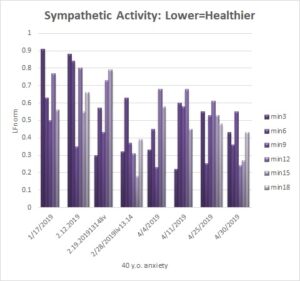A new model for the HPA axis explains dysregulation of stress hormones on the timescale of weeks.
Kristen Sparrow • March 17, 2021

 This study seeks to understand how the hypothalamic-pituitary-adrenal axis, or HPA, can become so dysregulated. What they found is that the actual size or mass of the affected organs can change. Stress and its sequelae is so important to all aspects of health, that any insights into its workings can be key. Acupuncture lowers stress levels as you see in the chart at the right. Autonomic activity is a dynamic measure of stress. The HPA changes over time. The full article is available at the link. Warning! This is a math heavy article!
This study seeks to understand how the hypothalamic-pituitary-adrenal axis, or HPA, can become so dysregulated. What they found is that the actual size or mass of the affected organs can change. Stress and its sequelae is so important to all aspects of health, that any insights into its workings can be key. Acupuncture lowers stress levels as you see in the chart at the right. Autonomic activity is a dynamic measure of stress. The HPA changes over time. The full article is available at the link. Warning! This is a math heavy article!
The take away, is that after prolonged stress of anorexia, alcoholism or pregnancy, it can takes months for ACTH (Adrenocorticotropic Hormone) to stabilize back to normal. The stipulation in this article is that it takes months for the size, mass of the organs to revert to normal. 3 months for pregnancy which, coincidentally is the traditional length of time for “lying in” after child birth in Asian cultures.
Karin O, Raz M, Tendler A, et al. A new model for the HPA axis explains dysregulation of stress hormones on the timescale of weeks. Mol Syst Biol. 2020;16(7):e9510. doi:10.15252/msb.20209510
Abstract
Stress activates a complex network of hormones known as the hypothalamic–pituitary–adrenal (HPA) axis. The HPA axis is dysregulated in chronic stress and psychiatric disorders, but the origin of this dysregulation is unclear and cannot be explained by current HPA models. To address this, we developed a mathematical model for the HPA axis that incorporates changes in the total functional mass of the HPA hormone‐secreting glands. The mass changes are caused by HPA hormones which act as growth factors for the glands in the axis. We find that the HPA axis shows the property of dynamical compensation, where gland masses adjust over weeks to buffer variation in physiological parameters. These mass changes explain the experimental findings on dysregulation of cortisol and ACTH dynamics in alcoholism, anorexia, and postpartum. Dysregulation occurs for a wide range of parameters and is exacerbated by impaired glucocorticoid receptor (GR) feedback, providing an explanation for the implication of GR in mood disorders. These findings suggest that gland‐mass dynamics may play an important role in the pathophysiology of stress‐related disorders.

